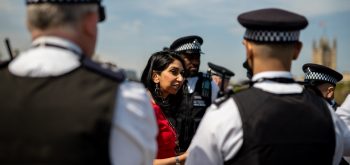Black, Asian and Minority Ethnic people were over four times more likely to be stopped and searched than white people – with the figure almost nine times higher for black people. A new report by Her Majesty’s Inspectorate of Constabulary drawing on Home Office data from 2019-20 found that black people were over 5.5 times more likely to have force used on them than white people, and that black people were 18 times more likely than white people to be searched under section 60 of the Criminal Justice and Public Order Act 1994.
The statistics have emerged days after senior Human Rights lawyers, meeting as part of JUSTICE, called for the end of stop and search (here) and the controversial gangs matrix (here).
The report has found that overwhelmingly the main reason cited by police for their use of stop and search powers is in order to ascertain suspected drug possession. HM Inspector of Constabulary, Wendy Williams, has highlighted that the issue with the police’s use of stop and search is that ‘that the proportion of stop and searches that actually find drugs is very low, and the disproportionate use of these powers on BAME people is having a damaging impact on public trust’. As such, she is now calling on police leaders to assess whether using stop and search as a means of targeting drug possession is actually effective – or just damages belief in the police as a force for good.
Issues with public trust in the police were also explored in an event last week by David Lammy, author of the influential 2017 Lammy review. The Tottenham MP, who was in conversation with the Legal Aid Practitioners Group, noted that ‘the fundamental trust issue begins with contact with the police’ (here). Speaking specifically about the use of the stop and search mechanism, Lammy stated that ‘It is very hard to be a black Londoner and make it to 23 without being stopped and searched. I have been stopped and searched on numerous occasions. If you’re innocent, you’re not doing anything wrong, but you’re told to put your hands up in public, you start to lose trust in the police. One of my boys was stopped and searched for the first time just a few weeks ago. That’s where it sets in.’
Wendy Williams, meanwhile, remarks that: ‘The public rightly expects the police to protect them by using their powers in an effective and fair manner. When the police use their powers disproportionately – in differing proportions on different ethnic groups – it causes suspicion among some communities that they are being unfairly targeted.’ In her assessment of the most recent inspectorate report, she finally concludes: ‘The damage caused by unexplained disproportionality can be far-reaching and long-lasting. It may lead to more Black, Asian and Minority Ethnic people being drawn into the criminal justice system, disrupting their education and family lives, and reducing their work opportunities. It feeds perceptions among the public and police about Black people and crime, and may also influence how the police allocate and deploy resources. This, in turn, exacerbates the imbalances in the criminal justice system.’







